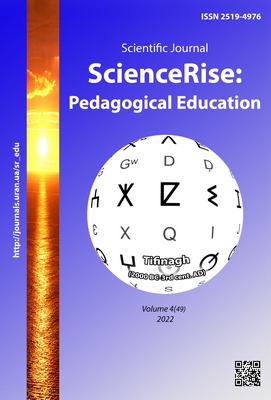Criteria for selection of educational material for the formation of future philologists’ Korean linguistic and socio-cultural competence in speaking
DOI:
https://doi.org/10.15587/2519-4984.2022.261344Keywords:
competence, linguistic and sociocultural competence, criteria for selection of educational material, Korean philologistAbstract
As we can see, the modern processes of modernization of higher education cause particular importance for the formation of professionally-oriented communicative socio-cultural competence, the primary task of the institution is the formation of professional and communicative competence. Korean language didactics needs research, developing and testing of the new teaching methods, because the Korean language is typologically different from the Ukrainian language, the culture of nonverbal behavior of Koreans has no analogues in the world. The study raises issues of modern methods of teaching foreign languages, focuses on the relationship between language and culture, based on the formation of socio-cultural competence.
The article is devoted to the definition of the main criteria, for which the selection of didactic material for the teaching of Korean oral students can be developed, as well as the formation of Korean linguistic and socio-cultural competence in speaking. The concept of Korean-speaking linguistic and socio-cultural competence in conversations with future philologists is determined, its role and place in the university curriculum are analyzed. The analysis of structural-component conformity of competence is carried out, special attention is paid to the main tasks and stages of formation of linguistic and sociocultural competence in accordance with the level of students' language proficiency. The definition of the concept of culturally marked vocabulary in the Korean language is proposed. The procedure for selecting educational material is outlined. The selection of educational lexical material for the formation of Korean linguistic and socio-cultural competence in speaking on the basis of qualitative and quantitative indicators is done. The selection and the analysis of culturally marked lexical items, culturally marked monologues-samples and dialogues-samples are carried out. Methodical recommendations for the formation of Korean linguistic and socio-cultural competence in speaking are also given
References
- Asadchykh, O. V. (2011). Suchasni pidkhody do navchannia skhidnomovnoho leksychnoho materialu. Naukovi zapysky Vinnytskoho derzhavnoho pedahohichnoho universytetu imeni Mykhaila Kotsiubynskoho. Seriia: Pedahohika i psykholohiia, 35, 56–60.
- Voronina, L. A. (2016). Spetcifika metodiki obucheniia koreiskomu iazyku kak inostrannomu na nachalnom etape v vuze. Saint-Petersburg: Izd-vo RGPU im. A.I. Gertcena, 127.
- Yeong-ran, K. (2011). Korean language textbooks and research on Korean language teaching in the light of language teaching theory. Seoul, 277.
- Azimov, E. G., Shchukin, A. N. (2009). Novyi slovar metodicheskikh terminov i poniatii (teoriia i praktika obucheniia iazykam). Moscow: IKAR, 446.
- Zahnitko, A. P. (2017). Linhvokulturolohiia. Vinnytsia, 287.
- Mak, A. S., Westwood, M. J., Ishiyama, F. I., Barker, M. (2000). The sociocultural competencies for success among international students: The Excell Program. Journal of International Education, 4 (2), 33–38.
- Safina, M. S. (2014). Formation of Socio-cultural Competence in Foreign Language Teaching. Procedia – Social and Behavioral Sciences, 136, 80–83. doi: http://doi.org/10.1016/j.sbspro.2014.05.292
- Sem’ian, N. V. (2019). Formuvannia u maibutnikh filolohiv anhlomovnoi linhvosotsiokulturnoi kompetentnosti v chytanni zasobamy poetychnoho tvoru. Kyiv, 234.
- Wonjung, M. (2016). Implicit notions of identity: the absence of explicit communication in Korean hybrid greetings. Universum, 31 (2), 119–140. doi: http://doi.org/10.4067/s0718-23762016000200008
- Hall , E.T.(1976). Beyond Culture. New York: Anchor Press, 235.
- Andronkina, N. M. (2009). Kognitivno-deiatelnostnyi podkhod k formirovaniiu lingvosotciokulturnoi kompetentcii v obuchenii nemetckomu iazyku studentov iazykovogo vuza. Ros.gos. ped. un-t im. A. I. Gertcena. Saint-Petersburg, 49.
- Borisko, N. F. (2000). Teoreticheskie osnovy sozdaniia uchebno-metodicheskikh kompleksov dlia iazykovoii mezhkulturnoii podgotovki uchiteleĭ inostrannykh iazykov. Kyiv: Kievskii gos. lingvist. un-t., 300–308.
- Bachinska, І. A. (2016). Formuvannia anglomovnoi lіngvosotcіokulturnoi kompetentcіi uchnіv starshoi shkoli. Kyiv, 23.
- Hasanova, S. (2014). Linguo-Cultural Aspect of Interrelation of Language and Culture. International Journal of English Linguistics, 4 (6), 160–166. doi: http://doi.org/10.5539/ijel.v4n6p160
- Akademichnyi tlumachnyi slovnyk ukrainskoi movy. Available at: http://sum.in.ua/s/skot
- Russko-koreiskii slovar. Available at: https://krdict.korean.go.kr/rus/dicSearch/search?nation=rus&nationCode=5&ParaWordNo=&mainSearchWord=%D0%B6%D0%B8%D0%B2%D0%BE%D1%82%D0%BD%D0%BE%D0%B5
- Haviland, J. B. (2006). Gesture as cultural and linguistic practice. Available at: https://pages.ucsd.edu/~jhaviland/Publications/GESTURE%20AS%20CULTURAL%20AND%20LINGUISTIC%20PRACTICE.pdf
Downloads
Published
How to Cite
Issue
Section
License
Copyright (c) 2022 Oksana Asadchykh, Oksana Kindzhybala

This work is licensed under a Creative Commons Attribution 4.0 International License.
Our journal abides by the Creative Commons CC BY copyright rights and permissions for open access journals.
Authors, who are published in this journal, agree to the following conditions:
1. The authors reserve the right to authorship of the work and pass the first publication right of this work to the journal under the terms of a Creative Commons CC BY, which allows others to freely distribute the published research with the obligatory reference to the authors of the original work and the first publication of the work in this journal.
2. The authors have the right to conclude separate supplement agreements that relate to non-exclusive work distribution in the form in which it has been published by the journal (for example, to upload the work to the online storage of the journal or publish it as part of a monograph), provided that the reference to the first publication of the work in this journal is included.








